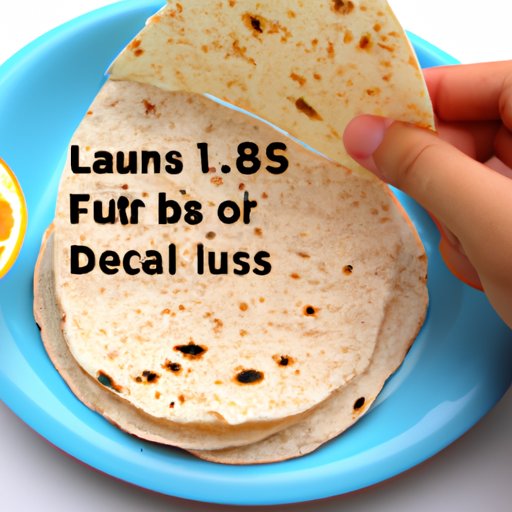Introduction
Tortillas are a staple of Mexican cuisine, made from either corn or flour and used to make tacos, burritos, quesadillas, and other dishes. But are tortillas bad for you? To answer this question, it’s important to understand the nutritional content of tortillas, as well as the potential health benefits and risks associated with eating them.

Exploring the Nutritional Content of Tortillas
The nutrition facts for one 6-inch corn tortilla vary depending on the brand, but a general breakdown looks like this: 80 calories, 0.5 grams of fat, 220 milligrams of sodium, 17 grams of carbohydrates, and 2 grams of protein. Flour tortillas contain slightly more calories and fat, with around 100 calories, 2 grams of fat, and 230 milligrams of sodium per 6-inch tortilla. Both corn and flour tortillas are low in saturated fat, cholesterol, and sugar.
Determining if Tortillas are a Healthy Choice for Your Diet
When it comes to choosing carbs for your diet, tortillas can be a healthy choice. According to registered dietitian Natalie Rizzo, “Tortillas provide complex carbohydrates, which are the preferred source of energy for our bodies. They also contain B vitamins, which help convert food into energy and keep our nervous system functioning properly.” Compared to white bread, tortillas contain fewer calories and more fiber and protein.
However, it’s important to note that not all tortillas are created equal. Some brands contain added sugar and preservatives, while others are made with refined wheat flour instead of whole wheat. When choosing a tortilla, look for one that is made with whole wheat and contains minimal ingredients.
Investigating the Health Risks of Eating Too Many Tortillas
Although tortillas are generally a healthy choice, eating too many can lead to some health risks. One of the main concerns is high sodium intake, which can increase blood pressure and put people at risk for stroke and heart disease. Additionally, eating large portions of tortillas can lead to weight gain, since they are relatively high in calories and carbohydrates.

Examining the Benefits of Choosing Whole Wheat Tortillas
Whole wheat tortillas are a great way to add more nutrients to your diet. Compared to regular tortillas, they contain more fiber, protein, vitamins, and minerals. Additionally, they have a lower glycemic index, which means they are less likely to cause a spike in blood sugar levels.

Comparing the Nutritive Values of Different Types of Tortillas
Corn and flour tortillas have different nutritional values. Corn tortillas tend to be higher in fiber and protein, while flour tortillas are higher in carbohydrates. Additionally, whole wheat flour tortillas are generally higher in calcium, iron, and vitamin B6 than corn tortillas.

Assessing How to Make Tortillas a Healthy Part of Your Diet
To make sure you’re getting the most out of your tortillas, limit portion sizes and choose toppings that are high in protein and nutrients. For example, adding grilled chicken, black beans, and salsa to a tortilla wrap can boost the nutritional value and make it a complete meal. Additionally, opt for whole wheat tortillas whenever possible, as they contain more fiber and vitamins than regular tortillas.
Understanding the Impact of Refined Flour on Tortilla Nutrition
Most store-bought tortillas are made with refined wheat flour, which has been stripped of its nutrient-rich bran and germ. As a result, these tortillas contain fewer vitamins, minerals, and fiber than those made with whole wheat flour. Additionally, refined flour can cause a rapid rise in blood sugar levels, which can lead to fatigue and cravings.
Conclusion
Tortillas can be part of a healthy diet as long as they are eaten in moderation. Choose whole wheat tortillas when possible, and be mindful of portion sizes and toppings. With the right choices, you can turn your tortilla wrap into a nutritious and delicious meal.
(Note: Is this article not meeting your expectations? Do you have knowledge or insights to share? Unlock new opportunities and expand your reach by joining our authors team. Click Registration to join us and share your expertise with our readers.)
